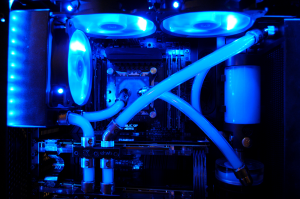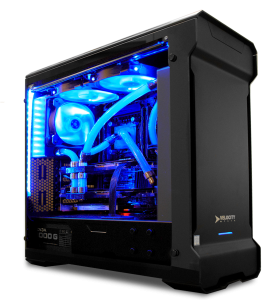If you’re shopping for a custom gaming, workstation, or enthusiast PC, you’re probably at least considering investing in water cooling. But is it really worth the extra expense? Is water cooling really better than air cooling? Let’s go over some of the advantages of water cooling vs air cooling and discuss which solution is best for what type of user.

So what is water cooling anyway?
Water cooling is the practice of using a liquid powered cooler – very similar to a car radiator – which takes advantage of the superior thermal properties of water to dissipate heat from the processor and often the video cards as well. Water cooled solutions can be simple, maintenance free, closed loop radiators like our LiquiCool 8 all the way up to insanely complicated set ups with custom tubes and piping, like our Intel Extreme Rig. And yes, the liquid can be actual distilled water (which is non-conductive) but is often a glycol-based solution similar to car antifreeze which does dissipate heat better.
Is water cooling necessary?
Ten years ago, I would have said yes, water cooling is a necessity on all high performance desktops. Components were much less efficient than they are now, and therefor generated significantly more heat, often resulting in instability or even shortening the life of the components. But with the latest hardware innovations of the past few years like Intel Broadwell-E and Skylake or NVIDIA’s GTX 10 graphics, improved efficiency has resulted in less power consumption and heat generation. This fact alongside the improvement of many air cooled solutions makes the expense of water cooling not needed for most users.
When is air cooling a better option?
Advanced air cool solutions have come a long way to closing the gap with water cooling, at least for most mainstream users. We generally recommend the PH-TC12LS from Phanteks for many customers because it cools almost as well as closed loop water coolers and is nearly as quiet under normal load, without the additional expense or possible maintenance of a water cooler. For most consumers working under normal operating conditions (i.e. not overly stressing the CPU, not overclocking, normal environment, etc.), air cooling is the best option.
So who does need water cooling then?
This doesn’t mean that water cooling is never needed though. For overclockers and high demand users who tend to push their systems to the max or those working in overly warm environments, we absolutely insist on a good water cool solution for maximum stability. For users that require the quietest system possible, water cooling’s often virtually silent operation is also probably the best choice.

Pros and Cons of water cooling vs air cooling
Let’s sum up with a list of the Pros and Cons of water cooling:
Pros:
- Dissipates heat better than most air cool solutions
- Usually whisper quiet aside from minimal radiator noise
- Aesthetics – Water cooling can look amazing when done right
Cons:
- Custom loop coolers need regular maintenance and can potentially leak as gaskets and seals degrade
- They can be expensive. Closed loop solutions may add close to $200 to the cost of the PC, while custom loops can be upwards of $2,000
- Water cooling may only provide a marginal advantage for many mainstream users given the recent improvement of advanced air cool solutions like the Phanteks PH-TC12LS
Interested in the most amazing water cooled PC money can buy? Check out our #IntelExtremeRig right here!
Josh Covington
Latest posts by Josh Covington (see all)
- RTX 6000 Pro Blackwell - July 1, 2025
- What is CUDIMM? - January 29, 2025
- X870 vs B850: Choosing the Right Motherboard for Your Build - January 17, 2025